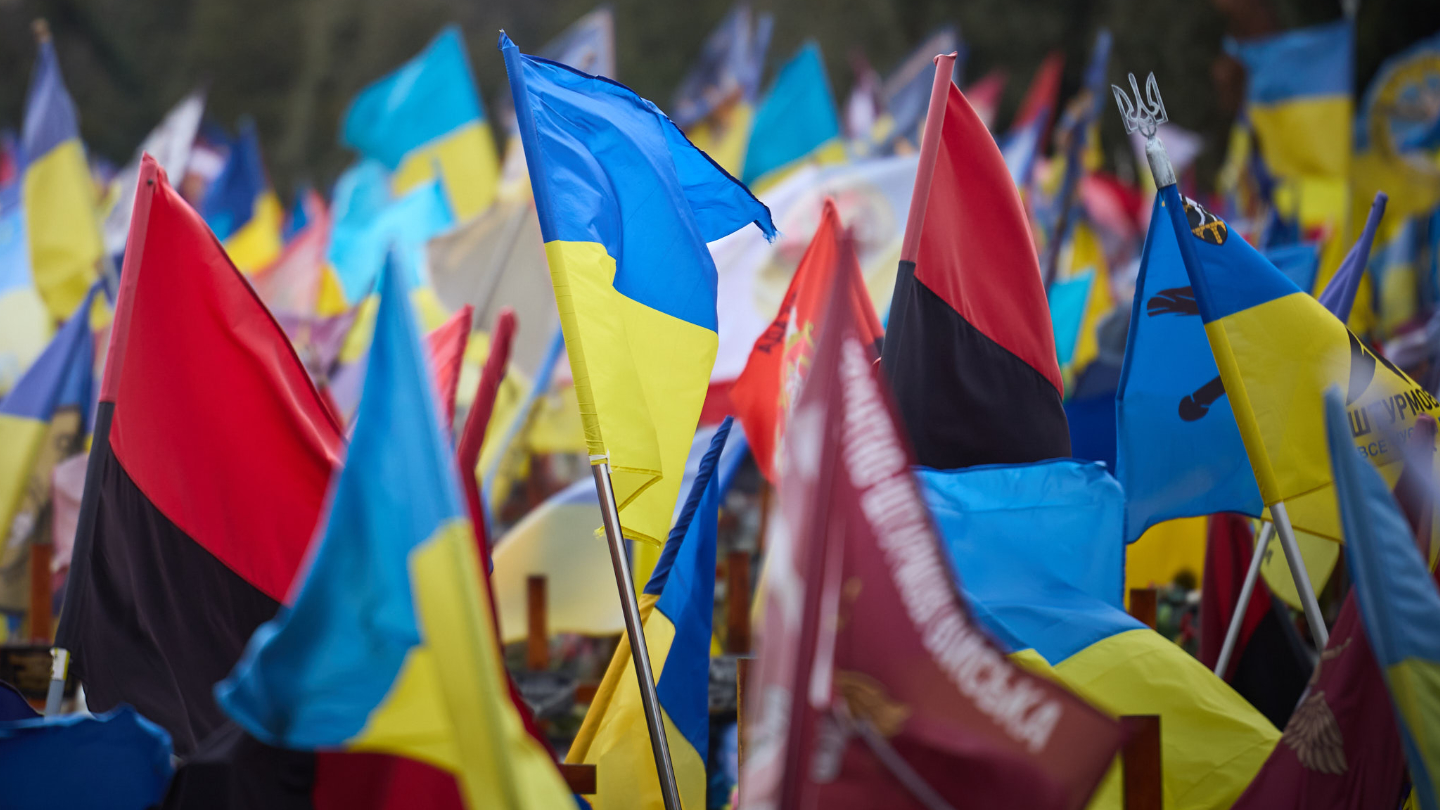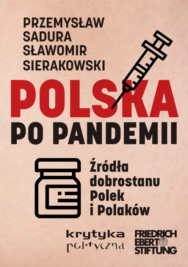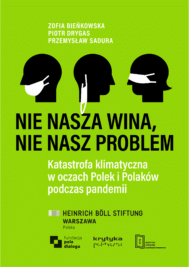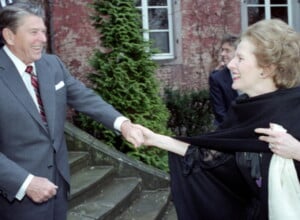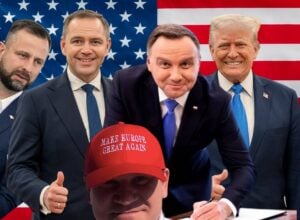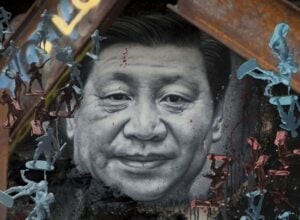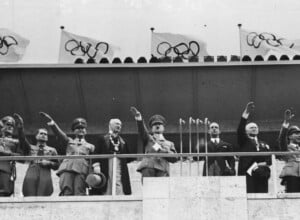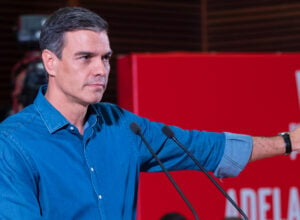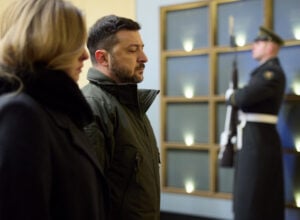Wojciech Siegień: Chciałbym zacząć od tytułu waszej książki – Jak Ukraina traciła Donbas, a nie Jak Rosja przejęła Donbas. Czy sugerujecie przez to, że to Ukraina jest winna utraty Donbasu?
Denys Kazanski: Tu trzeba wyłapać subtelności języka ukraińskiego. Nie napisaliśmy, że Ukraina straciła Donbas, ale że traciła czy traci, czyli to nie jest proces skończony. W książce staramy się przeanalizować błędy, które Ukraina popełniła, to, czego nie zrobiła, działania, jakich nie podjęła, aby zapobiec tej sytuacji.
Pamiętajmy, jak rozpoczęła się rosyjska agresja. Nie był to rok 2022, tylko 2014, bo już wtedy na terytorium Ukrainy wkroczyły rosyjskie wojska. Rosjanie temu zaprzeczali, bo były to siły, które nazywali prywatnymi firmami wojskowymi, takie jak Grupa Wagnera. Prigożyn, szef Wagnera, na krótko przed śmiercią przyznał w wywiadzie, że Grupa Wagnera powstała właśnie w 2014 roku i brała udział w walkach w Donbasie. Potem pojawiły się także rosyjskie formacje kozackie.
Czyli wojsko-niewojsko. Tak jak wojna to specjalna operacja wojskowa.
To były raczej uzbrojone rosyjskie jednostki z rosyjskimi obywatelami, z rosyjską bronią, które przybyły z terytorium Rosji. Potem przyszedł Igor Striełkow i jego oddział. Rosjanie weszli do Ukrainy, zasłaniając się paramilitarnymi formacjami, a Rosja nadal udaje, że jej wojsk w Ukrainie w 2014 roku nie było. Putin wykorzystał też budowane wcześniej grupy wpływów w Donbasie, które pozwoliły mu ukryć agresję.
Słuchaj podcastu „Blok wschodni”:
Jednym z wniosków, które wyciągamy w naszej książce, jest to, że w Donbasie nie było oddolnego separatyzmu i wojna nigdy by się nie rozpoczęła bez rosyjskiej interwencji i zasobów. Oznacza to też, że nie byłoby zbuntowanego Donbasu, który walczyłby z Ukrainą i chciał się oddzielić jako niezależny region. Bez tych dywersyjnych grup, które znajdowały się bezpośrednio w Ługańsku i Doniecku, ale i bez pomocy lokalnych elit, Rosja nigdy nie rozpoczęłaby tej wojny.
Z waszej książki dowiadujemy się, że agresja rozpoczęła się nawet wcześniej, na długo przed 2014 rokiem i wejściem do Ukrainy grup dywersyjnych: kiedy Donbas stał się swego rodzaju poligonem doświadczalnym dla różnych rodzajów działań hybrydowych, które Federacja Rosyjska rozwijała wobec Ukrainy. Pokazujecie na przykład, jak ruchy proekologiczne, które zostały sztucznie stworzone w Donbasie, ewoluowały następnie w antykapitalistyczne, antyzachodnie, a potem nagle antyukraińskie.
Podkreśliłbym, że to nie były ruchy ekologiczne, tylko pseudoekologiczne. W pewnym momencie Ukraina miała plany zagospodarowania złóż gazu łupkowego na wschodzie kraju. Rosja zdała sobie sprawę, że te plany stanowią zagrożenie dla jej monopolu gazowego i że Ukraina może w ten sposób uzyskać niezależność energetyczną, a więc zrezygnować z gazu rosyjskiego.
Czy te ruchy udawały całkowicie oddolne inicjatywy? Czy wspierały je większe organizacje lub partie?
Były wspierane na przykład przez Komunistyczną Partię Ukrainy, która była kontrolowana przez Rosję. Wspólnie zaczęli podsycać atmosferę strachu, że gaz łupkowy to jest śmierć dla środowiska, że wydobycie gazu zatruje wodę, że to będzie bardzo szkodliwe i ludzie zaczną masowo umierać. Tworzyli przerażające memy, zdjęcia, obrazy pełne czaszek, szkieletów, śmierci. Używali bardzo mocnego przekazu, który miały wywoływać przerażenie. A ludzie, którzy nie mieli wykształcenia i nie znali technologii wydobycia gazu łupkowego, po prostu zaczęli się bać.
I to zadziałało? Mimo że Donbas od upadku ZSRR cierpiał na zwijaniu przemysłu?
Tak, bo wpisywało się w lewicowe hasła. Komuniści mówili: kapitaliści chcą się wzbogacić, wypompowując gaz z naszej ziemi, a my będziemy cierpieć i umierać z powodu konsekwencji wydobycia gazu łupkowego. Tylko że w Donbasie wydobywa się przecież węgiel, więc jest to bardzo zanieczyszczony region pod względem ekologicznym. Wydobycie węgla spowodowało nieproporcjonalnie więcej szkód niż wydobycie gazu. Te ogromne hałdy, składowany na nich urobek, niekiedy skażony radioaktywnie, zalega na powierzchni, zatruwając wody gruntowe. Zresztą szkody środowiskowe i zdrowotne związane z wydobyciem węgla są powszechnie znane.
Mimo to nikt nie występował przeciwko wydobyciu węgla w Donbasie.
Straszydło zrobiono z gazu łupkowego. I rzeczywiście, wielu z tych ludzi, którzy udawali ekologów, dosłownie po kilku latach znalazło się w prorosyjskich organizacjach. O gazie łupkowym zapomnieli, wtedy już krzyczeli, że trzeba walczyć z kijowską juntą. A później widzieliśmy inne transformacje, na przykład między Kremlem a tak zwanymi antyszczepionkowcami, ludźmi, którzy mówili, że COVID-19 jest spiskiem.
Zatem agresja rozpoczęła się tymi hybrydowymi formami znacznie wcześniej niż w 2014 roku i przerodziła się z czasem w wojnę na pełną skalę. To, co się teraz dzieje w Donbasie, jest dla ciebie dowodem na to, że Rosja wie, jak planować działania strategiczne, czy wręcz przeciwnie?
Myślę, że jest to absolutna porażka Rosji, porażka całej ich tak zwanej miękkiej siły. Rzeczywiście, kiedy mówimy o tym, że agresja Rosji rozpoczęła się znacznie wcześniej, jako agresja hybrydowa, to rzeczywiście tak było. Rosja długo wykorzystywała formy niemilitarne. Jej agresja przeciwko Ukrainie tak naprawdę nigdy nie ustała, tyle że w latach 90. osłabła z powodu osłabienia samego państwa rosyjskiego. Ale generalnie trwała cały czas, miała formy bardziej informacyjne, medialne, ideologiczne, polityczne.
Rosja podporządkowywała sobie Ukrainę za pomocą intryg politycznych, próbując doprowadzić do władzy w Ukrainie prorosyjskich polityków, kupując polityków ukraińskich, kupując ukraińskie gwiazdy show-biznesu, niektóre osoby publiczne. Wydano na to mnóstwo pieniędzy. Nawiasem mówiąc, sami Rosjanie przyznali to później w swoich wywiadach. Jest wiele materiałów na ten temat, nie ukrywają tego. Ale to wszystko zakończyło się porażką. Ukraińcy okazali się silni i odporni na te zabiegi.
Ale jednak wschodnia część kraju, co dokładnie opisujecie w książce, czuła dużo antyzachodniego resentymentu. Te zabiegi padły na podatny grunt.
Oczywiście były w Ukrainie prorosyjskie nastroje, to prawda, ale nie wystarczyłyby, aby powstrzymać naszą chęć wejścia do Unii Europejskiej, do wspólnej zachodniej przestrzeni gospodarczej, żeby nie stać się drugą Białorusią. Wtedy Rosjanie zwrócili się ku brutalnej sile militarnej. To, co wydarzyło się w 2022 roku, to kolejna porażka, bo ta wojna w ograniczonym formacie, która trwała od 2014 roku, również nie przyniosła oczekiwanych przez Kreml skutków. Putin dosłownie wpadł w histerię i zdecydował się na wielką wojnę. Choć jestem pewien, że on myślał, że będzie tak, jak widzimy teraz w Syrii, że Rosjanie wejdą, a armia ukraińska po prostu ucieknie, że Zełenski ucieknie, tak jak teraz uciekł Asad. Ale plany Putina zawodziły raz za razem i dlatego cała jego polityka wobec Ukrainy to seria porażek. Miejsce, gdzie znajdujemy się teraz, czyli wojna, jest ich konsekwencją.
W mediach regularnie widzimy ofiary ostrzałów ukraińskich miast, ale bardzo rzadko widzimy to, co dzieje się po drugiej stronie frontu, w Donbasie. Wiemy, że Rosjanie próbują wymienić tamtejszą ludność, dzieje się to chociażby w Mariupolu. Ale czy ktoś tam został? Czy w Donbasie nadal mieszkają Ukraińcy? A nawet jeśli nie są już Ukraińcami, czy ludzie, którzy tam mieszkają, mogą w przyszłości zostać Ukraińcami?
To bardzo trudne pytanie, ponieważ nikt nie może dokładnie udzielić na nie odpowiedzi. Od 10 lat nie prowadzono żadnych badań na tym terytorium. Jest to niemożliwe, ponieważ na tych terytoriach faktycznie od 10 lat panuje terror. Jeśli ktoś tam otwarcie mówi, że jest za Ukrainą, to po prostu zostanie aresztowany, uwięziony, ogłoszony ukraińskim szpiegiem albo zabity. Takie osoby po prostu znikają, było wiele takich przypadków. W Doniecku i Ługańsku żadne obiektywne sondaże nie są po prostu możliwe, nawet liczba ludności jest ukrywana. Wiemy, że z terytorium, które zostało zajęte przez siły prorosyjskie w 2014 roku, wyjechało na terytorium kontrolowane przez Ukrainę w pierwszych latach wojny około miliona ludzi. To są ci, którzy zostali zarejestrowani jako wewnętrzni przesiedleńcy.
Ile osób mieszkało tam przed wojną?
Całkowita liczba ludności na terytorium obecnych pseudorepublik wynosiła 3,5 miliona. Oznacza to, że uciekła jedna trzecia ludności, jej najbardziej proukraińska część. Nikt nie wie, co stało się później. Rosja próbowała przeprowadzić spis ludności jakieś pięć lat temu. Zrobili to, ale nigdy nie opublikowali danych. To było nawet zabawne, bo intensywnie anonsowali ten spis powszechny w swoich mediach. Potem powiedzieli, że dane zostaną opublikowane później, a na koniec w ogóle odmówili ich publikacji, twierdząc, że są to informacje niejawne.
Moskwie nie spodobały się wyniki? Dlaczego?
Najprawdopodobniej na tych terenach została jakaś połowa ludności z tego, co było przed wojną. Wyjechali ludzie młodzi, aktywni. Nawet ci, którzy opowiadali się za Rosją, też wyjechali – tyle że do Rosji. W Doniecku pozostało niewielu ludzi, ponieważ życie tam po prostu zamarło. Można powiedzieć, że to miasto jest dzisiaj bazą wojskową. Od 10 lat obowiązuje tam godzina policyjna. Nie ma normalnych warunków do życia. Kiedy oglądamy filmy stamtąd, pokazujące zebranie czy spotkanie mieszkańców jakiegoś bloku lub spotkanie urzędnika z ludźmi, widzimy wyraźnie, że jest tam bardzo niewielu mężczyzn. Bo mężczyźni z Donbasu albo zostali zabrani na front, albo uciekli, żeby tego uniknąć.
Czy to rodzaj wojskowego matriarchatu?
Trudno to nazwać matriarchatem, bo kobiety nie posiadają tam żadnej władzy, nie są podmiotem. Ludzie zostali pozbawieni nawet prawa do wyboru przewodniczącego wsi, bo wszyscy są mianowani tylko z góry, zatwierdzani z Rosji. Dlatego sytuacja w tej części Donbasu jest naprawdę bardzo trudna. Ludzie ciągle narzekają, że drogi są w bardzo złym stanie, nie ma prądu, nie ma wody, windy nie działają. Jednocześnie nie ma miejsca na narzekanie, ponieważ nie ma samorządu, który można wybrać i który powinien być odpowiedzialny przed ludźmi. Dzisiejsi mieszkańcy okupowanego Donbasu są jak postaci w grze komputerowej, które nie ogrywają żadnej roli w rozgrywce, tylko po prostu gdzieś się poruszają, tworząc tło. Bo miejscowa ludność tak naprawdę nie odgrywa dla Rosjan żadnej roli.
Niedawno Wołodymyr Zełenski spotkał się w Paryżu z Donaldem Trumpem, co można uznać za początek rozmów o pokoju, który Trump tak bardzo chce przeforsować. Ukraina chciałaby porozumienia w formule „pokój przez siłę”, ale częściej mówi się raczej o „pokoju za ziemię”. Ile ziemi można oddać za pokój? Na swoim kanale w YouTube pokazałeś niedawno Władimira Konstantinowa, okupacyjnego przewodniczącego rady Krymu, który również mówi o pokoju za ziemię, ale z ich strony wygląda na to, że to oni szykują się na oddanie nawet części okupowanych terytoriów Ukrainy, tylko po to, aby Krym pozostał przy Rosji.
Uważam, że zgoda na formułę pokój za ziemię będzie tragiczna w skutkach nawet nie tyle dla samej Ukrainy, ile dla całego świata. Będzie to kolosalny cios dla wszystkich europejskich wartości zachodniej demokracji, uderzy w strukturę świata, w którym żyjemy. Ukraina funkcjonuje bez Doniecka, Ługańska i Krymu od 10 lat. Przeżyliśmy bez tych ziem i Ukraina nie umarła. Nasza gospodarka rozwijała się normalnie do 2022 roku, nawet bez tych terytoriów. Okazało się, że nie są one jakoś krytycznie potrzebne nam gospodarczo, możemy się bez nich obejść.
Ale nie na tym polega problem. Kłopot będzie wtedy, gdy okaże się, że dyktator taki jak Putin czy Kim Dzong Un może zaatakować sąsiednie demokratyczne państwo, np. takie, które zamierza przystąpić do Unii Europejskiej. W rzeczywistości agresja Rosji to jest kara za ten demokratyczny wybór. Okazałoby się, że możesz zaatakować państwo, uderzyć rakietami w szpital dziecięcy, zniszczyć kilka miast wraz z ludnością, zabić dziesiątki tysięcy cywilów, a na koniec cały świat powie: ok, w porządku, bierzcie, to jest część terytorium dla was. Samo postawienie pytania o oddanie terytoriów za pokój wywróci świat do góry nogami, bo okaże się, że wszystko to, czego nas uczono, czego uczy nas kultura zachodnia, nawet hollywoodzkie filmy – że nie można się poddać złu, że jesteśmy ludźmi, którzy zbuntowali się przeciwko zniewoleniu, że zawsze warto walczyć o wolność – nagle okaże się zupełnie bez znaczenia.
Zachodnie wartości zostaną skompromitowane. A to przecież główny cel Putina?
Tak. Okazuje się, że tyran może przyjść, zabić absolutnie niewinnych ludzi, zająć część sąsiedniego państwa, a cały świat przytaknie i powie: tak, świetnie, żyjmy dalej, jakby nic się nie stało. I pojawi się pytanie: co warte są te wszystkie idee demokracji i europejskiego wyboru, jeśli można zachowywać się w ten sposób? Ile warte jest prawo międzynarodowe, jeśli można zaatakować sąsiedni kraj, zająć jego część i wszyscy się z tym pogodzą? Co są warte ONZ czy Czerwony Krzyż? Przecież te organizacje nikogo przed niczym nie ochroniły. Mamy organizacje międzynarodowe, które są przez nas finansowane, przeznaczamy na nie dużo pieniędzy. Tymczasem sekretarz generalny ONZ przyjeżdża i spotyka się z Putinem, podaje mu rękę, mimo że Putin jest poszukiwany przez Międzynarodowy Trybunał Sprawiedliwości za zbrodnie wojenne!
Jakie mogą być konsekwencje ukraińskiej, ale i globalnej utraty zaufania do zachodnich wartości?
Myślę, że Chiny mogą z łatwością zaatakować i zniszczyć Tajwan. A może jutro Korea Północna zaatakuje Koreę Południową? A wtedy Korea Południowa dowie się, że przecież nie jest w NATO, podobnie jak Ukraina, dlatego nikt nie stanie w ich obronie. Ja mogę żyć bez podróżowania do Ługańska. Większą tragedią będzie to, że okaże się, że cały świat, wszyscy ludzie, którzy opowiadali się za demokracją, którzy mówili nam, że tyranię należy zwalczać, że nie można atakować drugiego kraju i okupować jego terytorium, po prostu kłamali, że to były puste słowa. Okaże się, że świat może po prostu zaakceptować zbrodnie wojenne, to że można zabijać ludzi i dzieci i nikt za to nie poniesie konsekwencji. To jest to, co uważam za najsmutniejsze.
Ale jest też inny punkt widzenia na problem okupowanych terytoriów. Ponieważ może być też tak, że zniszczony Donbas, zwrócony Ukrainie będzie jak koń trojański lub wirus wewnątrz Ukrainy. Czy nie obawiasz się, że jeśli Donbas wróci do Ukrainy, że będzie to pewnego rodzaju obciążenie dla kraju, że będzie cały czas działać na korzyść Rosji?
Tak, rzeczywiście, są takie obawy. Wszystko zależy od warunków, na jakich to się stanie. Rosja chciała zmusić Ukrainę do podpisania porozumień mińskich, wedle których Donbas miał wrócić do Ukrainy ze specjalnym statusem. Miał być państwem w państwie, a w rzeczywistości Rosja by go kontrolowała i wpływała tak na ukraińską politykę. Rosjanie chcieli w ten sposób uzyskać pakiet udziałów w Ukrainie i posiąść wpływ na naszą suwerenność, na naszą politykę zagraniczną. Jeśli powrót okupowanych terytoriów miałby się odbyć w takiej formie, to oczywiście przyniesie tylko niebezpieczeństwo. Jeśli mówimy o zwróceniu nam tego terytorium na zasadach, jakie obowiązywały przed 2014 rokiem, to w tym przypadku wszystko zależy od Ukrainy.
Ale jak sam mówisz tego, jak wyglądałby i funkcjonował Donbas po ewentualnym odzyskaniu, nie sposób dziś przewidzieć. Nie da się po prostu cofnąć czasu.
Teraz widzimy, że całe miasta są dosłownie fizycznie niszczone. W Bachmucie mieszkało 60 tys. ludzi, było to główne centrum przemysłowe rejonu, a teraz nie ma tam ani jednej osoby. Miasto jest całkowicie zniszczone, wyludnione, nie został nikt. To ruina bez życia i tam nie ma takiego problemu, jak sprawić, by ludzie na miejscu nie byli prorosyjscy, bo tam nie ma ludzi. Jeśli chodzi o tych, którzy pozostali w Donbasie, to musimy zbadać, kto tam pozostał, ilu tych ludzi jest. Zanim rozpoczęły się działania wojenne w 2014 roku, Donbas miał naprawdę silną elitę regionalną, byli to ludzie, którzy byli właścicielami firm, duzi oligarchowie, poważni politycy. Ale teraz, w ciągu 10 lat wojny, wszystko to zmieniło się w spaloną ziemię.
Wiemy, jak to wygląda poza całkowicie zniszczonymi miastami jak Bachmut?
Właściciele przedsiębiorstw faktycznie je utracili, bo zostały przejęte przez Rosję, a wiele zostało zniszczonych. Rosja po prostu pocięła fabryki na złom i wywiozła. Nie działają i już nigdy nie będą działać. Wiele kopalń jest zamkniętych i zalanych. Po 10 latach wojny w regionie nie ma lokalnej elity, społecznie, ale i przyrodniczo w wielu miejscach to jest taki księżycowy krajobraz, pustynia. Być może po zawarciu pokoju pojawi się tam coś nowego, ale w tej chwili trudno sobie wyobrazić, jak to będzie wyglądać.
Istnieją koncepcje renaturalizacji Donbasu. Może się okazać, że w postindustrialnym świecie donbaskie miasta są niepotrzebne. Czy to możliwe, że natura przyjdzie i przejmie to, co zostało? Czy istnieje możliwość, że będziemy mieli w Donbasie nowy rodzaj rezerwatu, jak to się teraz dzieje na terenie Zbiornika Kachowskiego?
Nie wierzę w rezerwat, ponieważ ta ziemia jest naprawdę bardzo okaleczona przez wojnę. I myślę, że niektóre obszary nie będą nadawały się do zamieszkania przez dziesięciolecia. We Francji wciąż istnieje tzw. zone rouge, obszar, do którego ludzie nie mają wstępu. To teren opuszczony od czasów pierwszej wojny światowej, bo w miejscu, gdzie przez kilka lat stał front, jest w ziemi tyle pocisków i odłamków, że nie da się jej oczyścić. I to terytorium jest po prostu jak zakazana, opuszczona strefa. Obawiam się, że w Donbasie będzie podobnie, ponieważ zanim zaczniemy mówić o odbudowie miast i rozpoczniemy odbudowę, trzeba jeszcze rozminować ten teren. Na przykład w byłej Jugosławii wciąż trwa rozminowywanie terenów, na których 30 lat temu toczyły się walki. Ziemia jest pełna odłamków, eksplodujących pocisków. Jej oczyszczanie wymaga ogromnych pieniędzy i mnóstwa czasu. Jak się w ogóle za to wszystko zabrać? Ile czasu to zajmie?
Poza tym czas przecież nie stoi w miejscu. Ludzie, którzy opuścili Donbas, próbują osiedlić się w nowych miejscach. Wielu wyjechało do Europy, niektórzy do innych miast w Ukrainie, gdzie znaleźli pracę, ich dzieci poszły do szkoły. Po wojnie mieliby porzucić wszystko i przyjechać do jakiegoś zniszczonego Bachmutu? Jeśli nawet zacznie się odbudowa, to ile czasu potrwa? Ile czasu zajmie, żeby miasto zaczęło pełnić podstawowe funkcje? Nie mamy takiego doświadczenia w naszym życiu, że terytorium po takim zniszczeniu jest odbudowywane i ludność tam wraca. Więc myślę, że być może część tego terytorium zamieni się w jakiś rodzaj rezerwatu, ale nie taki jak parki narodowe, a taki jak zona czarnobylska. Być może będą jakieś wycieczki, stalkerzy prowadzący ludzi chcących zobaczyć ruiny miast, które będą przypominały jakieś starożytne ruiny, terytorium nienadające się do życia.
Czy sądzisz, że na naszych oczach kończy się pewien mit Donbasu jako regionu przemysłowego?
Donbas kiedyś w Związku Radzieckim i w Ukrainie był naprawdę bardzo przeludniony, miał niezwykle wysoką koncentrację ludności, bo żyło tam ponad 5 milionów ludzi. To rekord, nigdzie indziej w Ukrainie nie mieszkało tylu ludzi. Wydaje mi się, że nastąpi powrót do czasów sprzed industrializacji, kiedy w czasie budowy przemysłu przyjechało dużo ludzi, którzy zasiedlili region w ogromnych miastach wokół fabryk. Teraz to wszystko wróci do stanu, w którym będzie półtora miliona czy dwa miliony mieszkańców, mieszkających w ocalałych miastach, w pobliżu jakichś przedsiębiorstw, które będą w stanie dostosować się do realiów postindustrialnego świata.
Putin nie ma żadnych planów na kolonizowanie tych rejonów? Rozpoczął wojnę tylko po to, by nie zostawić tam kamienia na kamieniu?
W przypadku prób odbudowy okupowanego Mariupola Rosjanie dostrzegli ekonomiczną wykonalność jego odbudowy, ponieważ jest to miasto nad morzem, chcą sprzedawać tam nieruchomości, zrobić z niego kurort. Za to małe miasteczka to najbardziej problematyczny obszar.
Było takie miasto Popasnaja. Mieszkało tam 20–23 tys. ludzi. Jest okupowane przez armię rosyjską od wiosny 2022 roku. Zostało całkowicie zniszczone i w ogóle go nie odbudowują, po prostu je porzucili. Pozostało tam 50 osób, mieszkają w ruinach, bez światła, wody, nic tam nie ma. Co z tym zrobić? Jaki jest sens ekonomicznej odbudowy tego miasta? Kto tam przyjedzie mieszkać? Można zbudować kilka domów w stepie, ale kto i gdzie będzie tam pracować? Tym bardziej że przedsiębiorstwa w okolicy zostały zniszczone. Kto miałby odbudować Bachmut i po co, skoro nie ma tam już tego przemysłu, który kiedyś sprawił, że tylu ludzi tam mieszkało?
Inny przykład to Marinka na przedmieściach Doniecka. Nie został tam nawet jeden cały dom. To wielkie wysypisko odpadów budowlanych i jest oczywiste, że bardziej opłacałoby się zbudować podobne małe miasteczko od nowa w gołym stepie niż odbudowywać to zrujnowane. Przynajmniej wtedy nie byłoby potrzeby rozminowywania terytorium. Dzisiaj nie wiemy, jak to będzie wyglądało, jak taka odbudowa miałaby się ziścić, a przede wszystkim kto by za nią odpowiadał. Sytuacja jest niestabilna, nikt nie wie, jak zakończy się wojna, na czym będzie polegało porozumienie, jeśli w ogóle do niego dojdzie. Myślę, że w tym stanie zawieszenia tym bardziej nie będzie żadnych inwestorów, którzy będą chcieli odbudować te miasta. Poza tym w Rosji i w Ukrainie populacja się kurczy. Nie ma ludzi, jak wcześniej, na przykład po II wojnie światowej, którzy mogli zaludniać miasta, budować je. Nie ma chłopów migrujących ze wsi w innych regionach do miast do pracy. Dlatego uważam, że pod tym względem Donbas nigdy nie powróci do stanu sprzed 2014 roku.
Czy według ciebie rok 2025 przyniesie jakiś przełom na froncie?
Jestem sceptyczny, kiedy słyszę, że nowy rok przyniesie jakiś przełom. Nie widzę żadnych warunków dla szybkiego zakończenia wojny, ponieważ uważam, że głównym problemem tego, co się teraz dzieje, jest obsesja Putina, jego ślepa nienawiść do Ukrainy. Nie da się racjonalnie wytłumaczyć tego, co robi Rosja. Wszystkie cele, które Putin ogłosił, nie są prawdziwe. Mówił, że Rosja broni Donbasu, ludności rosyjskojęzycznej. Tylko czy to jest obrona Donbasu? W Donbasie nigdy nie było tyle żalu i tylu ofiar śmiertelnych, takiego zniszczenia, nawet podczas II wojny światowej. Absolutnie wszyscy w Ukrainie nienawidzą Rosji, nawet ci, którzy kiedyś ją kochali.
To dotyczy również tych porzuconych ludzi, sfrustrowanych, wykorzystywanych przez prorosyjskie klany przez ponad 20 lat przed 2014 rokiem, prawda?
Tak. Nastąpił proces odwrotny, niż zakładał Putin, bo zamiast deklarowanej denazyfikacji dostali naród, w którym 99 proc. ludzi ich głęboko i szczerze nienawidzi. Jeśli mówimy o demilitaryzacji, cóż, nie mam tu żadnego komentarza, ponieważ broń, którą Ukraina ma teraz, to nowoczesna broń zachodnia, rakiety, lotnictwo, czołgi i wszystko inne. Wtedy, kiedy Rosja postanowiła nas zdemilitaryzować, Ukraina nie mogła nawet marzyć o takiej broni. W porównaniu z 2022 rokiem Ukraina jest znacznie bardziej zmilitaryzowana.
Czyli Putin osiągnął dokładnie odwrotny rezultat w stosunku do wszystkiego, co planował.
Ten człowiek jest po prostu psychopatą, który chce zniszczyć Ukrainę i naród ukraiński za to, że nie chcieliśmy, tak jak Białoruś, podporządkować się Rosji, że odważyliśmy się dokonać naszego europejskiego wyboru. Rosja nie może osiągnąć swoich celów, bo one nie są prawdziwe, ale może nas dalej karać i to jest dzisiaj przesłanie reżimu Putina: jeśli nie zrobicie tego, czego chcemy, to was zabijemy. Mimo to nie widzę zdecydowanego stanowiska Zachodu. Cały czas próbują flirtować z Putinem, rozmawiać z nim. I słuchają tego, co mówią im Putin i Ławrow. A ci z kolei widzą tę słabą pozycję Zachodu i nie zamierzają przestać, bo czują, że mogą robić to, co chcą. Dlatego nie wierzę w koniec wojny w 2025 roku.
**
Denys Kazanski – dziennikarz śledczy, prezenter telewizyjny i wideobloger, którego publiczność na Ukrainie liczy ponad milion subskrybentów. Autor Czarnej gorączki (2015), poruszającej temat nielegalnego wydobycia węgla w regionie Donbasu. Do 2014 roku mieszkał i pracował w Doniecku.

 Wspieraj
Wspieraj 

 Wspieraj
Wspieraj  Wydawnictwo
Wydawnictwo 
 Zaloguj się
Zaloguj się 